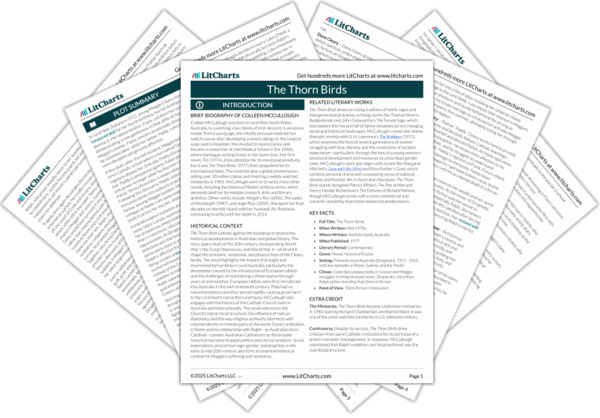The thorn bird symbolizes the cost of striving for something sacred or unreachable, especially for Ralph, whose rise in the Church demands that he give up love. The Celtic myth of the thorn bird tells of a creature that sings its most beautiful song only once, at the moment of death, after impaling itself on a thorn. Ralph follows a similar path. He becomes a Cardinal—a title that also happens to be the name of a bird—by choosing the Church over Meggie again and again. His success requires sacrifice, and each step up the Church’s hierarchy takes him further from the life he might have had with her. By the time he realizes he has fathered a son, Dane, it is too late: it is only Dane dies tragically in a drowning accident when Meggie confesses to Ralph that Dane is his son. He dies not as a powerful and fulfilled figure, but as a man broken by what he gave up. But the thorn bird does not symbolize Ralph alone. Meggie sacrifices her happiness to raise Dane, Fiona carries a lifetime of grief for Frank, and Justine feels (however unfairly) that she has lost brother because she chose ambition over family. Thus, the myth of the thorn bird speaks to all the book’s characters who struggle with feelings of grief and regret. The pain is different, but the pattern is the same—great love, followed by great loss.
The Thorn Bird Quotes in The Thorn Birds
“Each of us has something within us which won’t be denied, even if it makes us scream aloud to die. We are what we are, that’s all. Like the old Celtic legend of the bird with the thorn in its breast, singing its heart out and dying. Because it has to, it’s driven to. We can know what we do wrong even before we do it, but self-knowledge can’t affect or change the outcome, can it? Everyone singing his own little song, convinced it’s the most wonderful song the world has ever heard. Don’t you see? We create our own thorns, and never stop to count the cost. All we can do is suffer the pain, and tell ourselves it was well worth it.”










